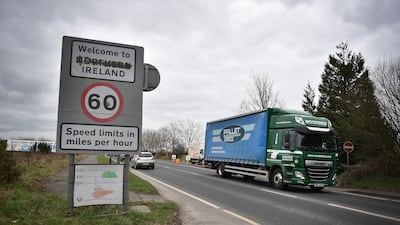British ministers on Wednesday hailed the Northern Ireland deal after MPs voted in favour of the revised Brexit agreement thrashed out by Prime Minister Rishi Sunak's government with the European Union.
Chris Heaton-Harris, the Northern Ireland secretary, praised the deal as MPs supported it 515 to 29 — a majority of 486.
While almost 70 Conservative MPs did not support the Windsor Framework, the measure did not need to draw support from Labour, the largest opposition party in the House of Commons, for clearing the showdown with rebels.
“The Windsor Framework is a turning point for the people of Northern Ireland, fixing the problems with the old protocol to ensure the smooth flow of internal UK trade, safeguard NI’s place in the Union and address the democratic deficit,” a government spokesman said.
The Windsor Framework includes post-Brexit trading arrangements for Northern Ireland, which is the only part of the UK to share a land border with the EU.
Former prime ministers Boris Johnson and Liz Truss were among 22 Conservative MPs to rebel and another 48 Tory MPs did not vote at all.
The deal includes the Stormont brake regulations — elements that supporters indicate will give Northern Ireland a say on EU rules.
Six DUP MPs — a pro-union party in Northern Ireland — and the independent Andrew Bridgen also opposed the regulations.
Before the vote, Mr Heaton-Harris told MPs: “Without this measure, Northern Ireland would continue to have full and automatic dynamic alignment with EU goods rules with no say for the Northern Ireland Assembly and no veto for amending or replacing those measures.
“That is an intolerable situation and I urge all MPs to vote to end that full and automatic dynamic alignment.”
There were fierce clashes among Tories on either side of the debate.
Chris Clarkson said the phrase “pathological denial of reality” came to mind when he listened to veteran eurosceptic Bill Cash.
Mr Cash said laws made in the EU “still apply to and subjugate the people of Northern Ireland to the EU and not to the rest of the UK”.
The government has welcomed the Commons vote backing the Stormont brake in Mr Sunak’s new agreement on post-Brexit trading arrangements for Northern Ireland.
“We are pleased the House of Commons has endorsed the Windsor Framework and agreed the legislation to enact the Stormont brake — the most significant part of the Windsor Framework,” a government spokesman said.
“The Stormont brake puts power back into the hands of Stormont and Westminster, ending the automatic alignment and ratchet effect of new EU law in Northern Ireland that would exist without it.
Mr Johnson, writing in The Daily Telegraph, said: “The proposed arrangements would mean either that Northern Ireland remained captured by the EU legal order — and was increasingly divergent from the rest of the UK — or they would mean that the whole of the UK was unable properly to diverge and take advantage of Brexit.”
Ms Truss was understood to believe the Prime Minister's Windsor pact does not “satisfactorily resolve the issues thrown up by” the Northern Ireland Protocol and “almost fatally impinges” on the UK's ability to diverge from EU rules and regulations.
The pro-Brexit European Research Group of MPs, which was influential during the debate over whether to leave the EU, has said members have been “strongly recommended” to oppose the deal.
Chairman Mark Francois said the agreement had been “rushed and oversold”.


